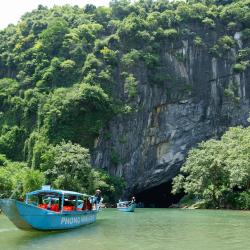The Importance of Supporting Sustainable Local Tour Operators
The call for sustainability has echoed across various sectors, and tourism is no exception. As travelers become more conscious of their ecological footprint, there has been a growing emphasis on adopting sustainable practices to preserve the planet for future generations. Within this realm, supporting sustainable local tour operators emerges as a crucial component that aligns economic benefits with environmental responsibility. These operators often lie at the intersection of community empowerment and environmental stewardship, making them vital to the future landscape of global tourism.
Preserving Local Culture and Environment
One of the most compelling reasons to support sustainable local tour operators is their commitment to preserving both the environment and the local culture. These operators usually have deep-rooted connections with their surroundings and possess a granular understanding of the unique aspects of their region's ecology and traditions. By promoting eco-friendly practices, they help mitigate the adverse effects of tourism on biodiversity and landscapes. Furthermore, by offering tours that emphasize authentic cultural experiences, local operators ensure that traditions and heritage are respected and perpetuated rather than diluted or commodified.
Economic Empowerment and Resilience
Sustainability in tourism isn’t just about environmental impact; it's also about creating economic resilience. Sustainable local tour operators contribute significantly to the local economy by creating jobs and supporting other small businesses in the community, such as restaurants, artisans, and transportation services. By retaining tourism revenue within the community, these operators help develop an economic infrastructure that can withstand global shocks, like the recent pandemic. Furthermore, nurturing local enterprises leads to the equitable distribution of income, reducing economic disparities and laying the groundwork for long-lasting prosperity.
Reducing Carbon Footprint
Travel and tourism contribute to global greenhouse gas emissions, with significant amounts originating from transportation and accommodation. Sustainable local tour operators often prioritize low-impact practices, such as offering biking, hiking, or canoeing tours, which not only enrich the traveler’s experience but also minimize the carbon footprint. Moreover, by focusing on local resources and accommodations, they cut down extensive supply chains and promote energy-efficient, locally-sourced solutions. Many of these operators are trailblazers in adopting renewable energy and waste management systems that set a standard for others in the industry.
Promoting Social Justice
Sustainable local tour operators champion social justice by fostering an inclusive business model that recognizes and rewards the contributions of indigenous and marginalized groups. They serve as platforms for voiceless communities, allowing them to share their stories and talents directly with visitors. This practice not only provides a more enriching travel experience but also cultivates mutual respect and understanding between different cultures. Ultimately, by prioritizing social equity, these operators help dismantle historical exploitation patterns in the tourism industry.
Enhancing Traveler Experience
While the sustainability aspect is paramount, it is also worth noting that local operators often provide a richer, more engaging travel experience. Their deep knowledge of the area ensures that travelers gain genuine insights and access to hidden gems that might be overlooked by larger, more impersonal tour companies. This personalized attention often results in more meaningful and memorable interactions between visitors and host communities.
Conclusion
As tourism continues to rebound and rebuild in a post-COVID-19 era, the industry's stakeholders must embrace sustainable solutions to ensure its longevity. Supporting sustainable local tour operators presents a harmonious avenue whereby tourism can be a force for good—promoting ecological balance, economic equity, and cultural integrity. Travelers, policymakers, and businesses must unite in this endeavor to create responsible, impactful, and sustainable tourism that stands the test of time. By making informed choices today, we are investing in a brighter, more sustainable tomorrow for our global community.






















